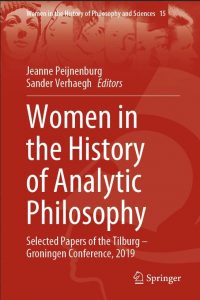Women in the History of Analytic Philosophy - Springer
 The book Women in the History of Analytic Philosophy (2022), edited by Jeanne Peijnenburg and Sander Verhaegh, is part of the Springer series Women in the History of Philosophy and Sciences and presents a collection of papers from the workshop held in October 2019 in Tilburg, Netherlands, dedicated to highlighting the contributions of female philosophers to the development of early analytic philosophy. In the following, we present „Susanne Langer and the American Development of Analytic Philosophy“ by Sander Verhaegh:
The book Women in the History of Analytic Philosophy (2022), edited by Jeanne Peijnenburg and Sander Verhaegh, is part of the Springer series Women in the History of Philosophy and Sciences and presents a collection of papers from the workshop held in October 2019 in Tilburg, Netherlands, dedicated to highlighting the contributions of female philosophers to the development of early analytic philosophy. In the following, we present „Susanne Langer and the American Development of Analytic Philosophy“ by Sander Verhaegh:
Susanne K. Langer is best known as a philosopher of culture and student of Ernst Cassirer. In this chapter, however, I argue that this standard picture ignores her contributions to the development of analytic philosophy in the 1920s and 1930s. I reconstruct the reception of Langer’s first book The Practice of Philosophy—arguably the first sustained defense of analytic philosophy by an American philosopher—and describe how prominent European philosophers of science such as Moritz Schlick, Rudolf Carnap, and Herbert Feigl viewed her as one of the most important allies in the United States. In the second half of this chapter, I turn to Langer’s best-selling Philosophy in a New Key and reconstruct her attempts to broaden the scope of the, by then, rapidly growing U.S. analytic movement. I argue that her book anticipated various developments in analytic philosophy but was largely ignored by her former colleagues. I end the chapter by offering some clues as to why New Key did not incite the same laudatory responses from analytic philosophers as her earlier work.
You cannot copy content of this page








